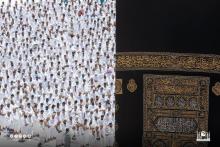
The Messenger of Allah ﷺ said, “There are no days during which righteous deeds are more beloved to Allah than these days,” meaning the (first) ten days of Dhul Hijjah. [ Sunan Ibn Majah #1727 ]
But, where do I even begin? Not to worry, here is a list of ways you can make the most of this Dhul Hijjah even if you’re not at Hajj.
1. Fast!
It's common to fast on the 9th day of Dhul-Hijjah, the Day of Arafah, but did you know that it's sunnah to fast the first 8 days as well? This year, set that alarm for suhoor every day. Fasting is a good reminder to stay engaged and mindful of your goals during the 10 days.
2. Purify your intentions
You may have a busy ten days with different responsibilities pulling your time. Make an intention to allocate time for ibadah, and also renew your intentions for the everyday tasks you have to do. All of our actions can take us closer to Allah if we do it for Allah’s pleasure.
3. Learn about the virtues of Dhul Hijjah
Seeking knowledge is a form of worship. The Prophet ﷺ said, “Whoever travels a path in search of knowledge, Allah will make easy for him a path to Paradise.” [ Sahih Muslim #2699 ]
4. Give in charity
All deeds are worth more during the sacred hours of Dhul Hijjah, especially giving in charity.
5. Get your body going! Volunteer
In the midst of increased fasting, prayer, and charity, there is no better time to dedicate a few hours to your community. Sign up for a shift at a food shelter, help clean a highway, or assist with a halaqa at your local mosque—there are endless ways to get involved.
6. Increase in remembrance: dhikr
The Prophet ﷺ said, "During [the 10 days of Dhul-Hijjah] recite a great deal of tahleel, takbeer, and tahmeed.”
La ilaha illa Allah, Allahu akbar, Alhamdulillah
Make these three sayings a centerpoint of your days!
7. Practice gratitude
Being grateful is both a core component of an Islamic mindset and a frequently recommended mindfulness method. A practice of regular gratitude through reflecting on one's blessings and saying "alhamdulilah" can keep you mindful and connected during the 10 days.
8. Pray tahajjud and other nawafil
Prayer is, of course, a year round practice. But this is a chance to hone in on your daily prayers. Spend a little more time on each of them, aiming to increase your focus and intent, and, if you can, sprinkle in extra sunnah prayers.
9. Reflect & make du’a
The 9th day of Dhul Hijjah, the Day of Arafah, is a time for extra devotion. Those on Hajj are spending it deep in du’a, while many of us at home are fasting before Eid celebrations begin. Set aside time on the 9th day to sit down and speak intimately with Allah, knowing with all your heart that He is as-Sami, the One who always listens.
10. Offering the udhiya (qurbani)
Of all the methods to draw closer to Allah during these incredibly blessed days, perhaps the greatest is sacrificing an animal. By doing so, we follow the sunnah of our father Prophet Ibrahim (as), provide the meat as charity to those who are in need, establish one of the rites of Islam, and ultimately draw closer to Allah. In fact, the offering of sacrifice is often called qurbani, from the word qurb, which means closeness. This is a form of drawing closer to our Creator.
The Prophet ﷺ said, “No human performs a deed on the day of Sacrifice (i.e., the 10th of Dhul Hijjah) more beloved to Allah than the sacrifice of an animal. On the Day of Judgment, it (the sacrificed animal) will appear with its horns, and hair, and hooves, and indeed its blood will be accepted by Allah from where it is received before it even falls upon earth, so let your heart delight in it." [ Sunan Ibn Majah #3126 ]
11. Prepare for Eid
Eid falls on the 10th of Dhul Hijjah and is meant to be a joyous day. Prepare for it by calling friends and family over to your home. Wrap presents for those you love and decorate consciously. Be sure to be considerate of new converts in your community and help them join in your celebrations.
